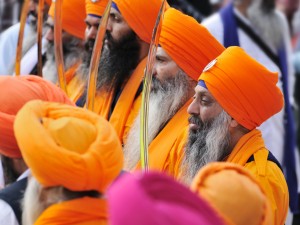
1. Vaisakhi is one of the most important holidays in the Sikh religion; however, surprisingly, it didn’t begin among Sikhs. Long before Sikhs celebrated the holiday, communities in Punjab, a region in northern India, held festivities on Vaisakhi to celebrate the harvest. Later in 1699 it was the date chosen by Guru Gobind Singh to mark Sikhism as a more united faith.
2. Although Sikhism was founded in the Indian state of Punjab, today many Hindus live there as well. Vaisakhi is celebrated by Hindus, too. Its significance for Hindus is as a harvest festival and, for many, the start of the new year.
3. Vaisakhi is sometimes also spelled as Baisakhi. It can be celebrated in different ways depending on Hindu or Sikh traditions. In Sikhism, people sing, dance and decorate their places of worship throughout the day. In Hinduism, individuals traditionally give gifts to family and friends, and go to temples seeking blessings.
4. Sikhs sometimes choose Vaisakhi as the day on which to be baptized as a member of the Khalsa, originally a brotherhood of spiritual soldiers. The first men to be baptized into the Khalsa in 1699 are known as the Panj Piare, or ‘Beloved Five’ and today, Sikhs take part in the Amrit Ceremony that originated with those five original members. In modern times, members – either male or female – are initiated by drinking sugar water that must be stirred with a dagger. New members must take on responsibilities once they become part of the Khalsa; for instance, individuals must not cut their hair, and all men must wear turbans. Women are granted a little more freedom and are not required to wear turbans. Generally, Sikhs are expected to aspire to Khalsa baptism.
